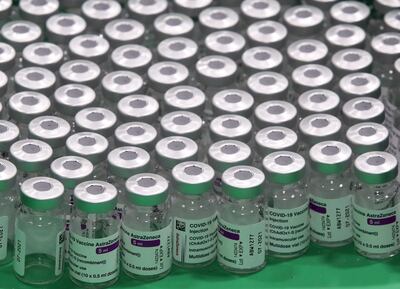Abu Dhabi’s Hope Consortium is expected to treble its storage capacity by the end of 2021, a senior health official said on Thursday.
Dr Omar Najm, senior adviser at the Department of Health Abu Dhabi, said the global logistics centre would be able to store 18 billion vaccine doses in the future.
It can currently handle six billion doses, and dispatch small shipments to countries with limited cold-storage capacity.
Since its establishment late last year, it has delivered 20 million vaccines to 26 countries.
Members said the number has so far been limited by production, but deliveries are expected to rapidly accelerate over the coming months.
“The Hope Consortium, with all of its different partners, has the capacity, the capability, to the quality required, to transport, store and deliver up to six billion doses this year,” Dr Najm said at an online event ahead of a vaccine logistics conference next week.
“That is going to go up to 18 billion by the end of this year.”
More than four billion people in the world will need to be vaccinated over the next two years to end the pandemic, Dr Najm said.
Most of the current Covid-19 vaccines are delivered in two doses, equating to a minimum requirement of at least eight billion doses.
But the emergence of variants and the unpredictable duration of protection offered by vaccines mean it could be necessary to plan for the distribution of billions more.
The consortium did not mention the vaccine manufacturers it is working with because of confidentiality agreements.
But according to Robert Sutton, head of logistics cluster at Abu Dhabi Ports, they include western-produced mRNA vaccines, which require ultra-cold storage.

The centre’s facilities in Abu Dhabi can store up to 70 million vaccines, which require standard refrigeration temperatures of 2°C to 8°C, including those produced by Sinopharm and Oxford/AstraZeneca.
It also has the capacity to handle between three million and five million vaccines that require ultra-cold storage of minus 80°C. There are 50 "freezer farm" units in the facility for such vaccines.
"Abu Dhabi Ports has developed one of the world's largest cold and ultra-cold storage centres," said Capt Mohamed Al Shamisi, group chief executive of Abu Dhabi Ports and chairman of the Operations Steering Committee.
“Freezing temperatures, as we know, are imperative for Covid-19 vaccine storage.”
However, the storage of even standard refrigeration temperatures can prove problematic for some countries.
An estimated three billion of the world's 7.8 billion population live in areas that cannot maintain a vaccine "cold chain", and there are growing fears that those most in need wll not be vaccinated.
The consortium aims to address the issue by stockpiling vaccine doses for such countries.
An online event next week will discuss the vaccine distribution challenges as the world seeks to end the pandemic.
“At this summit, we have three clear objectives,” Capt Al Shamisi said.
One, they include the collaboration and co-ordination of “manpower, assets, assistance and infrastructure networks across all industries and geographies worldwide".
“Two, sharing information and exchanging ideas and engaging in open dialogue around the logistical challenges of vaccine distribution from production to the patients.
“And three, uncover scalable real-world solutions to achieve mass, equitable and worldwide distribution.”
The online event on March 29-30 will include speakers from the World Health Organisation and the Bill & Melinda Gates Foundation.
Dr Tedros Adhanom Ghebreyesus, director general of the WHO and Stanley Erck, president and chief executive of drug maker Novavax will speak at the event.
Novavax is in talks with the US regulators to get its Covid-19 vaccine approved.
More than 1,000 people are expected to attend the online event.
The consortium, an Abu Dhabi-led public-private partnership, is responsible for the mass distribution of Covid-19 vaccines.
It includes Department of Health Abu Dhabi, Etihad Cargo, Abu Dhabi Ports Company, Rafed, part of ADQ, and SkyCell.













